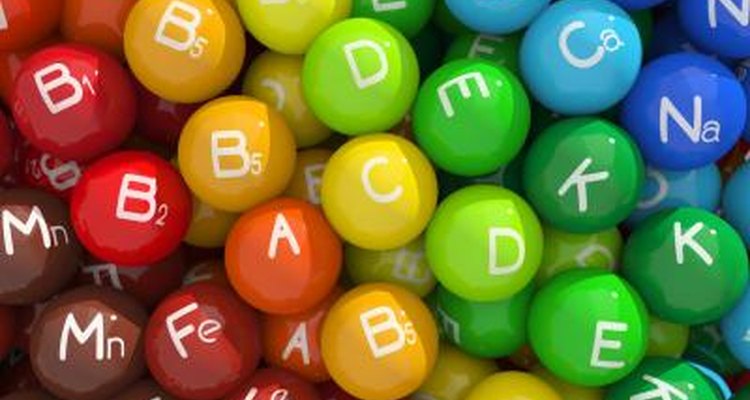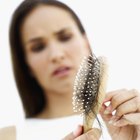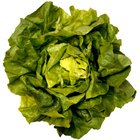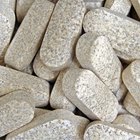
The liver is the engine of your body, playing a vital role in many processes that help keep you alive. This organ stores vitamins and glucose for energy, helps control cholesterol levels, cleanses your blood of wastes, and makes clotting factors, immune cells and digestive enzymes. An underactive or damaged liver can lead to a drop in the production of enzymes and proteins and a loss of stored nutrients. Get sufficient amounts of vitamins in your daily diet to help protect and heal your liver.
Vitamins C and E
Vitamin C is an antioxidant that neutralizes damaging molecules called free radicals and potentially other toxic substances in the body. This water-soluble vitamin works with another antioxidant, vitamin E, which functions in fatty parts of the body. Research published in 2002 in the "Archives of Toxicology" found that a single concentrated dose of these antioxidants helped to prevent liver damage caused by pesticide poisons that had leached into the body. In the study, patients were injected with doses of 200 milligrams per kilogram of body weight of vitamin C and 150 milligrams per kilogram of body weight of vitamin E. Most adults require 75 to 90 milligrams of vitamin C and 15 milligrams of vitamin E per day. Good sources for these antioxidant vitamins include fruit, leafy green vegetables and legumes.
Vitamin B-6 and Antioxidants
Like other B vitamins, vitamin B-6 plays a role in food metabolism and energy production in your body. It is also necessary for the antioxidant action of other vitamins, according to an animal study published in "Clinical Nutrition" in 2005. Researchers found that a vitamin B-6 deficiency in rats caused a reduction in the protective abilities of antioxidants and an increase in damage to the liver tissues. Additional research is needed to confirm whether vitamin B-6 has the same effect in people. Most adults require 1.3 milligrams of vitamin B-6 per day from foods such as meat, poultry, legumes, potatoes, bananas and watermelons.
Vitamin K and Blood Clotting
Your liver requires vitamin K to produce various enzymes that stimulate the production of clotting proteins and other substances. The Linus Pauling Institute explains that vitamin K is a cofactor that activates liver proteins to bind to calcium and trigger clotting mechanisms. Intestinal bacteria produce about half the vitamin K you need. You still require 90 to 120 milligrams per day from sources such as liver, milk, spinach, broccoli, cabbage and kale.
Deficiencies Due to Liver Disease
Liver disease due to alcoholism and other causes leads to deficiencies in several essential vitamins. The National Institute on Alcohol Abuse and Alcoholism notes that a vitamin A deficiency is common in patients with liver diseases such as cirrhosis. This vitamin plays a role in modulating bile production in the liver and is also necessary for healthy bone growth and eye function. Other deficiencies that are linked to liver disease include vitamin B-1 or thiamine, vitamin B-2 or riboflavin and B-9 or folate. Getting adequate amounts of these vitamins in your diet may help improve liver health. B vitamins are found in a range of foods including squash, dairy, whole grains, meat and poultry. Good sources of vitamin A include beef, liver, eggs, fortified milk, sweet potatoes, carrots, spinach and mangoes.
Related Articles

What Are the Benefits of Coconut Milk ...

The Best Vitamins for Sinuses

What Foods Provide Calcium D-Glucarate?

Is Zinc Good for Hair Growth?

Which Vitamins Can Help Reverse ...

Nutrition Information on Blueberries

Ingredients in Hairfinity Vitamins

Nutritional Benefits of Butter Leaf ...

How to Reduce Acne Inflammation

Zinc & Copper for Aging Skin

Zinc Treatment for Rosacea

Are There Foods That Heal Age Spots?
Selenium For Children

The Best Anti-Cellulite Supplements

L-Lysine for Hair Growth

Collagen & Rosacea

What Are the Benefits of Coconut Milk ...

Best Time to Take Vitamin B Complex

Essential Enzymes for Hair Growth

A List of Foods That Contain Choline
References
- Archives of Toxicology: The Effects of Methidathion on Lipid Peroxidation and Some Liver Enzymes: Role of Vitamins E and C
- European Journal of Internal Medicine: Antioxidant Liposoluble Vitamins and Carotenoids in Chronic Hepatitis
- NYU Langone Medical Center: Vitamin C
- Clinical Nutrition: Oxidant/Antioxidant Status in Liver Tissue of Vitamin B6 Deficient Rats
- Linus Pauling Institute: Vitamin K
- National Institute on Alcohol Abuse and Alcoholism: Relationships Between Nutrition, Alcohol Use, and Liver Disease
Writer Bio
Nadia Haris is a registered radiation therapist who has been writing about nutrition for more than six years. She is completing her Master of Science in nutrition with a focus on the dietary needs of oncology patients.
Photo Credits
Yakobchuk/iStock/Getty Images